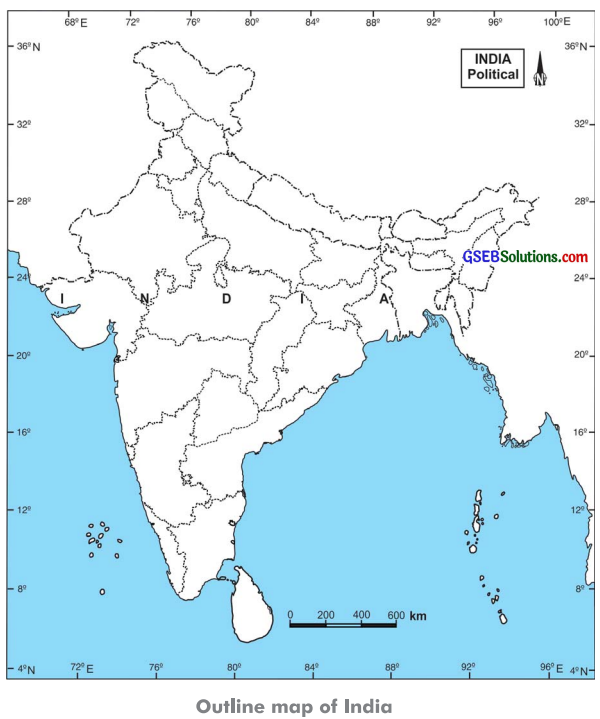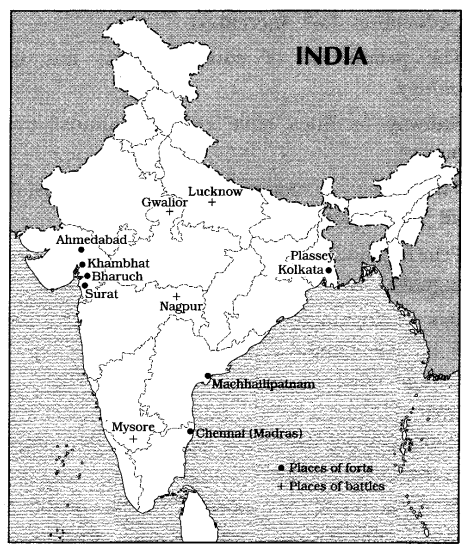Gujarat Board GSEB Solutions Class 8 Social Science Revision 1 Textbook Exercise Important Questions and Answers, Notes Pdf.
Gujarat Board Textbook Solutions Class 8 Social Science Revision 1
GSEB Class 8 Social Science Revision 1 Textbook Questions and Answers
Let us understand:
Question 1.
Reasons of the coming of the Europeans to India.
Answer:
During ancient times, India was one of the most prosperous countries of the world. People of various countries were attracted to the prosperity of India. People of many countries wanted to become wealthy by trading with India.
First of all Arab traders entered India from the north-western boundaries and established trade with our country. But the situation changed, and trade via land routes stopped. Consequently, demand of Indian commodities like silk, cotton clothes, muslin, black-pepper, spices, etc. increased in European countries. Taking advantage of this situation, many countries of Europe started looking for a sea-route to India. A brave Portuguese sailor named Vasco- da-Gama was the first to discover a sea-route to India. So, Portugal was the first country to come to India for trade. Thereafter, the Dutch, the British and the French came from the Netherlands, England and from France respectively to carry out trade with India.
![]()
Question 2.
‘Water is life’
Answer:
The liquid component of Earth is called I ‘Hydrosphere’. It includes oceans, seas, bays, straits,
lakes, ponds, rivers, etc. The hydrosphere covers about 71 % of the Earth’s surface. A water body that carries huge amount of water is known as an ‘Ocean’. Pacific, Atlantic, Indian and Arctic are the four oceans on Earth and they are connected to each other. These oceans are huge and deep and have valleys which are as deep as 10 to 11 km at their bottom. Ocean beds have features similar to that of the Earth’s surface with mountains, plateaus, vast plains, valleys, etc.
Oceans contain about 97 % of water on Earth and about l/3rd of remaining water is trapped in ice-caps and glaciers. Only some water is accumulated in lakes, while some flows into rivers and some is stored in the interior of the Earth as ground water. The amount of potable water (water fit for drinking) or fresh water is very less. Fresh water beings precious should be used with care and should not be wasted.
Life cannot be sustained without fresh drinking water. Moisture for rain, which is the main source of fresh water, comes from oceans. Valuable chemicals, fish, salt, minerals, etc. are obtained from seas and oceans. A large variety of aquatic life is sustained in oceans and seas. The tremendous force of waves, tides and ocean currents is a potential source for generating electricity. Oceans are also useful as waterways.
Question 3.
Democratic form of government
Answer:
The main feature of the Indian Constitution is democratic rule. General elections are held in our country every five years. Indian citizens of 18 years or above cast their vote and elect their representatives. Any voter of the country can contest am election without any discrimination of religion, caste, class or gender. Representatives elected by the people rule the country by taking responsibility of the people.
Question 4.
Natural disasters
Answer:
Names of natural disasters :
- Earthquake,
- Volcano,
- Tsunami,
- Flood,
- Drought,
- Storm (Cyclone),
- Forest fire and
- Landslides.
![]()
Let us think
Question 1.
Why were European traders successful in establishing their rule in India?
Answer:
When the British came to India, there were many small and large states in India. There was no internal unity among them. Sometimes a king would take the help of the British army to defeat another king. Though kings who accepted Subsidiary Alliance had the British army, they could not make use of it. Moreover, the British army had modern weapons like guns and cannons. The soldiers who were loyal to their leaders fought with discipline. Thus, despite the British had a small army, they could establish their rule all over India.
Question 2.
How did the reforms introduced by the British benefit Indians?
Answer:
Benefits of British reforms for the British :
- With English education the British government got administrative workers who knew English.
- Many machines were invented to facilitate industry, transport and communication.
- In 1853 the British government started railway in India for quick transportation of army.
- In 1854 C.E. British government started modern system of telegraph and post in India. Thereafter printing press and newspapers also started in India.
Benefits of British reforms for Indians:
- English education also developed national emotions among Indians.
- The emotion of nationalism was inculcated in the minds of Indians who were brought closer with education, newspapers, railways and posts and telegraphs.
- Nationalistic emotions created a longing for freedom in the minds of literate Indians.
- With English education, people became familiar with new trends of the world and national awareness spread in the country.
Thus, though the reforms were introduced by the British for their benefit, they benefitted Indians too. This is how British reforms proved a blessing to Indians too.
Question 3.
Why are more powers given to the Central Government by the Constitution of India? –
Answer:
India is a Union of states and has 29 states and 7 union territories. The Constitution has joined these states with the Central Government. They have no right to be free v from the union. Moreover, there is a state arrangement of federation in India. So the Indian Constitution has given more powers to Central Government.
![]()
Question 4.
What are the harmful effects of developmental activities of humans on various spheres ?
Answer:
- Oil spills from ships and
- Disposal of industrial and chemical waste into rivers, streams, ponds, lakes and seas pollutes the water and destroys marine life. This is highly dangerous for the hydrosphere.
- Polar ice caps have started melting due to increasing heat.
The balance of the various spheres of Earth has been disturbed due to activities undertaken (knowingly or unknowingly) by humans for their own development. Activities like nuclear testing, excessive drilling for mineral oil or tubewells, dumping of waste, releasing smoke from factories and exhaust from vehicles, etc. pollute all the spheres surrounding Earth.
Due to increase in heat around Earth, the Polar caps have started melting, rain has been affected adversely due to thoughtless cutting of trees. All these activities affect the biosphere.
Volume of carbon dioxide (CO2) has increased in the atmosphere and hence there is increase in global warmin
Among all the members of the solar system, only Earth has got suitable temperature, air and water required to sustain life.
Human activities like intense mining for minerals, underground nuclear testing, deep drilling to obtain mineral oil and tube wells etc. affect the lithosphere adversely.
Question 5.
Why did the Europeans discover a sea-route to India?
Answer:
Merchants from various countries came to India for trade from north-west by land route. For years Arab traders used this land route for their trade. However trade via land route stopped due to changed situations. This increased the demand of Indian products like silk and cotton cloth, muslin, spices like cloves, pepper, etc. in European countries and it became necessary to discover a new sea-route to India. Taking advantage of this sit-uation many adventurous sailors from European countries tried to discover a new sea-route to India.
![]()
Question 6.
Which internal factors are responsible for natural disasters ?
Answer:
Population explosion, environmental pollution, gas filtration, land degradation, deforestation, soil erosion, global warming, etc. are the internail factors responsible for natural calamities.
Let us do on our own
Question 1.
How has modern life in India benefitted ” from the reforms introduced by the British for their benefits?
Answer:
The benefits to present day India due to reforms introduced by the British for their benefits are :
- Indian women became free from social evils like ‘Sati’. An atmosphere of women’s liberation and male- female equality was created in the country.
- English education has become countrywide in India. So contacts with people of our country and foreigners have increased.
- Number of universities have increased, so the scope of education has increased.
- The proportion of educated girls has increased in the country.
- Railway facilities have reached almost every part of the country.
- The facility of modern telegraph and postal system is seen all over India.
- Printing and circulating newspapers in almost all Indian languages have been established all over India.
Feelings of freedom of speech and thought have been developed in the minds of Indians. - Widow remarriage has given back their status to “* such women.
- Evil customs like child marriages and sati practice have been banned by law.
- Modern India has been created on the basis of such public facilities and administration frame.
Question 2.
Form a School Panchayat and make a list of rules to be followed in the school.
[Note: Students should form a School Panchayat and note down the list of rules to be followed in every school in their notebooks.]
Question 3.
Plant a tree and nurture it to protect the lithosphere.
[Note: Each student should plant a tree in the school compound or garden and nourish it.]
![]()
Question 4.
On the given outlined map of India, locate the factories / forts established by the British. Also show the battle grounds where the British fought battles with the India as well as the other European powers in India.

Answer:
The forts and the places where the British engaged in battle are as shown in the map given below:
